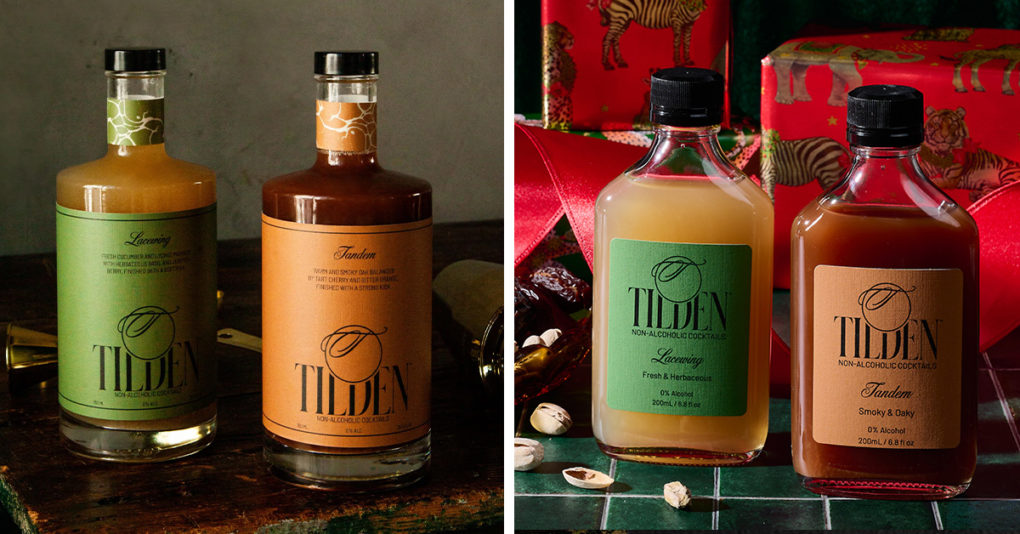
Launched in February, Harvard Business School grads Vanessa Royle and Mariah Hilton Wood spent two years developing a non-alcoholic cocktail intended to help consumers have “meaningful social experiences.” Social is a key word for the brand, as its messaging centers on its beverages being served over ice and garnished before savoring amongst friends.
Their two zero-proof cocktails, both priced at $35, include The Lacewing, featuring cucumber, basil, lychee, and szechuan pepper, and The Tandem with American oak, lapsang, cherry, plus a ginger and cayenne kick.
“The flagship was always intended to be our 750 ml bottles, a sharable, pourable format that speaks to the gathering and experiential culture of our brand,” said Royle.
But as the team shared flasks at sales meetings, retailers and hotels called out additional use cases for the smaller format. Retailers requested the smaller sizes to allow customers to try out the product before committing to the larger bottle, she said. While non-alcohol spirits, wine and beer have now grown into a market value exceeding half a billion dollars off-premise, mocktails are emerging as the gateway for consumers who still have misconceptions about their zero-proof options.
Hotels were also looking for use in minibars, which is more of a solo-sipping occasion, the founders added. There was also interest in the set for holiday gifting, which gave them further rationale to continue using glass even in the smaller format.
“We’ve considered cans and have not counted them out, but when it comes to brand, what we do and create is more important than what we say,” said Wood. “We are intentionally establishing our brand to live in gatherings and elevated cocktail occasions.”
The flasks still ask to be poured into beautiful glassware, she added, and are still a double serve, not a single. If ready-to-serve mocktails are to follow the trajectory of their full-proof analogs, there could be a growing niche for the new brand: the 750 ml RTS size is up 29.7% in off-premise channels in the 52 weeks ending September 9, according to NIQ, with premium and above brands faring better in recent years. Glass bottles in the “other” size category were up 25.7% but represent only 1% of total share of RTDs.
In Tilden’s own category, non-alc RTDs are setting the pace for the non-alc spirits category, representing 32% of dollar share and up 160% compared to last year off-premise in the 52 weeks ending July 29.
But on-premise has been the major focus of the brand, as it angles for the restaurants and bars solving for the one in seven on-premise visitors drinking non-alc alternatives.
“We’ve had the most success in venues that appreciate the ease of a pour with such complex flavor,” said Royle.
Similar to full-proof RTDs like Wandering Barman, Tilden will have to stake its claim by offering craft cocktail quality drinks to the on-premise accounts that don’t have the capacity for elevated cocktails but want to meet expectations for premium experiences. It has a few competitors, such as Phony Negroni, which found some success when it launched last year with orders at more than 200 New York bars and restaurants. Tilden offers its restaurant partners standard garnish recommendations, but has found others with custom cocktail cultures personalizing their pours with cucumber ice, apple foam, or a cinnamon rim.
The founders have been pushing on-premise since launching in their home bases of Santa Barbara and Boston, but are carried across locations in 15 states in specialty retail and bottle shops as well, and shipping nationally. Since launching last week, the set of flasks (priced online at $29 for two) are mainly getting picked up at retailers stocking up for the holidays who want to “offer new options to their customers,” said Wood.